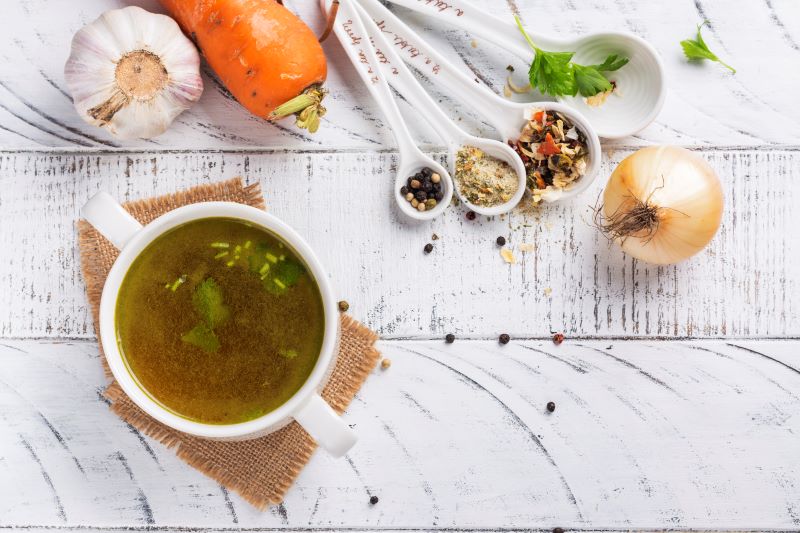Collagen. You may already be familiar with its numerous benefits. But if you haven’t been following the buzz, here’s what you’ve missed: supporting everything from blood vessels to vibrantly lustrous hair, collagen is a boon for both skin and body. While that’s good news, here’s an even better tidbit: you can actually boost your body’s continued production of collagen through the foods you eat!
What you need to know about collagen
Before we start piling our plates with collagen-rich foods, we should ask: what is collagen, exactly?
It’s a protein naturally produced by your body and it’s concentrated in skin, muscles, bones, blood vessels, joints, tendons and the digestive system. Collagen is significant to your physical health as well as your appearance (especially helpful for supporting smoother skin and fewer fine lines!). It’s a game-changing protein, accounting for roughly a third of your body’s total protein makeup. But what does this mean for you? Collagen benefits include:
-
- Healthy, lustrous hair
- Strong nails
- Support for the normal health and functioning of blood vessels, connective tissue and tendons†
Your body naturally produces an abundance of collagen… until it begins to decline drastically around the ripe old age of twenty. (Yep, twenty.)
Foods high in collagen
Don’t let declining collagen production get you down! You can replenish this protein through a regular diet of some of these healthy choices, including collagen-rich foods and foods that contain crucial nutrients to stimulate collagen production:
- Meats such as chicken, fish and shellfish are natural food sources of collagen – in fact, it’s likely that one or more is the source of collagen in your supplement (more on that later).
- Berries, including strawberries, blueberries and blackberries, are loaded with free-radical-fighting antioxidants, including vitamin C, which is crucial for collagen production.
- Red and orange veggies are good for just about everything, right? Collagen production is certainly no exception.
– Red veggies are loaded with lycopene and are known to boost collagen levels. Dive into those sweet red peppers! (And don’t forget tomatoes, too; although they’re botanically fruits, they’re considered vegetables by nutritionists.)
– Reach for orange veggies to help restore any damaged collagen in your body. Carrots, anyone? - Leafy greens: We can’t forget superfood superstars that also assist in protection from free radicals. If ever there was a time to learn to love spinach, this is it!
- Garlic: If you’re anything like me, garlic is an easy addition. I love adding it to any recipe I can for the flavor and aroma. Garlic helps rebuild damaged collagen while boosting its production. Taurine, lipoic acid and sulfur found in garlic make these benefits possible.
- Bone broth: Now, if you know me at all, you’ll notice I saved my favorite for last. Bone broth is what I like to refer to as “liquid gold.” It’s just that good! When you sip on a tasty cup of bone broth — or better yet, make a delicious soup — you’re filling your body with unbelievable amounts of cooked collagen. Adding bone broth to your regular diet provides vital nutrients, antioxidants, amino acids and more. While it’s my absolute favorite for my collagen-producing needs, I admit it’s on my go-to list for just about everything else for my body, inside and out.
Collagen supplements
Supplementing with collagen also helps stimulate your body’s production. The use of collagen supplements that are packed full of amino acids can help your body synthesize collagen. Collagen used in many supplements comes mainly from four sources:
- Cow (Bovine)
- Chicken
- Fish
- Pig (Porcine)
You’ll discover collagen peptides, or hydrolyzed collagen supplements, are generally sold in powder form; some pre-mixed with additional healthy foods that stimulate collagen production.
Tip: When choosing collagen supplements, consider the health of the animal source – look for organic supplements from grass-fed animals.
Adding collagen powder to recipes
Arguably one of the most popular collagen sources, grab-and-go powders (as mentioned above) are versatile and convenient, and can help you turn many of your favorite foods into delicious sources of collagen.
Editor’s Note: Here are some of the best collagen recipes from The Upside blog:
- Pumpkin Spice Collagen Latte
- Creamy Collagen Butter Coffee
- Keto Mocha Collagen Shake
- Watermelon Agua Fresca Collagen Drink
- Honey-Lemon Collage Vinaigrette
- Keto Cauliflower Mac & Cheese with Collagen
- Butternut Squash Collagen Casserole
- Collagen Fudge
†These statements have not been evaluated by the Food and Drug Administration. These products are not intended to diagnose, treat, cure or prevent any disease.

